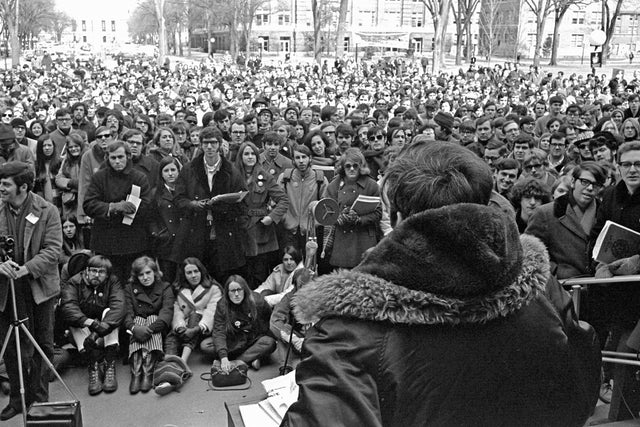HAPPY EARTH DAY – The environmental movement
Every year on April 22, Earth Day marks the anniversary of the birth of the modern environmental movement in 1970. In the decades leading up to the first Earth Day, the World was consuming vast amounts of leaded gas through massive and inefficient automobiles. Industry belched out smoke and sludge with little fear of the consequences from either the law or bad press. Air pollution was commonly accepted as the smell of prosperity. Until this point, the mainstream remained largely oblivious to environmental concerns and how a polluted environment threatens human health.
However, the stage was set for change with the publication of Rachel Carson’s New York Times bestseller Silent Spring in 1962. The book represented a watershed moment, selling more than 500,000 copies in 24 countries as it raised public awareness and concern for living organisms, the environment and the inextricable links between pollution and public health.
Earth Day 1970 would come to provide a voice to this emerging environmental consciousness, and putting environmental concerns on the front page. As in 1970 and even in 2010, Earth Day came at a time of great challenge for the environmental community to combat the cynicism of climate change deniers, well-funded oil lobbyists, reticent politicians, a disinterested public, and a divided environmental community with the collective power of global environmental activism. In the face of these challenges, Earth Day prevailed and EARTHDAY.ORG reestablished Earth Day as a major moment for global action for the environment.
Over the decades, EARTHDAY.ORG has brought hundreds of millions of people into the environmental movement, creating opportunities for civic engagement and volunteerism in 193 countries. Earth Day engages more than 1 billion people every year and has become a major stepping stone along the pathway of engagement around the protection of the planet.

EARTH DAY TODAY
Today, Earth Day is widely recognized as the largest secular observance in the world, marked by more than a billion people every year as a day of action to change human behavior and create global, national and local policy changes. Now, the fight for a clean environment continues with increasing urgency, as the ravages of climate change become more and more apparent every day.
As the awareness of our climate crisis grows, so does civil society mobilization, which is reaching a fever pitch across the globe today. Disillusioned by the low level of ambition following the adoption of the Paris Agreement in 2015 and frustrated with international environmental lethargy, citizens of the world are rising up to demand far greater action for our planet and its people.
The social and cultural environments we saw in 1970 are rising up again today — a fresh and frustrated generation of young people are refusing to settle for platitudes, instead taking to the streets by the millions to demand a new way forward. Digital and social media are bringing these conversations, protests, strikes and mobilizations to a global audience, uniting a concerned citizenry as never before and catalyzing generations to join together to take on the greatest challenge that humankind has faced.

By tapping into some of the learnings, outcomes, and legacy of the first Earth Day, EARTHDAY.ORG is building a cohesive, coordinated, diverse movement, one that goes to the very heart of what EARTHDAY.ORG and Earth Day are all about — empowering individuals with the information, the tools, the messaging and the communities needed to make an impact and drive change.
We invite you to be a part of Earth Day and help write many more chapters—struggles and victories—into the Earth Day book.
WHAT CAN YOU DO FROM HOME?
- Plant seeds of change
If you can, plant a garden that welcomes pollinators
- Join youth-led climate movements online
Greta Thunberg and the youth-led climate strike movement have taken to the internet—temporarily. Fridays for Future is hosting online webinars and conversations to share climate stories from around the planet. https://fridaysforfuture.org/
- Find your local mutual aid group
Communities across the World have been organizing to support all community members through the COVID-19 crisis. Get involved, meet and learn from folks in your neighborhood and build bonds that will outlast this pandemic. Google ‘mutual aid group’ and your city and you’ll likely find one on Facebook!
- Banking
Don’t invest in fossil fuels Find out if you are investing in fossil fuels through your banking institution. Stopping the money pipeline to companies that are extracting dirty energy is something you can do by simply moving your money.
- GREEN YOUR POWER
There are more and more Renewable Energy Schemes now giving you the option to switch your home energy to green power. Switching to a renewable energy supplier is easy and will not cost you anymore in bills.
- NATURE
Spend some time in nature on Earth Day and digi-detox.
- YOUR FOOTPRINT
Everyone has an environmental footprint. It comes from all the things you do that have an impact on our planet – the energy you use, the things you buy, the food you eat. With the My Footprint app, you can choose challenges that suit you, to make small changes in your own life that add up to something bigger.



